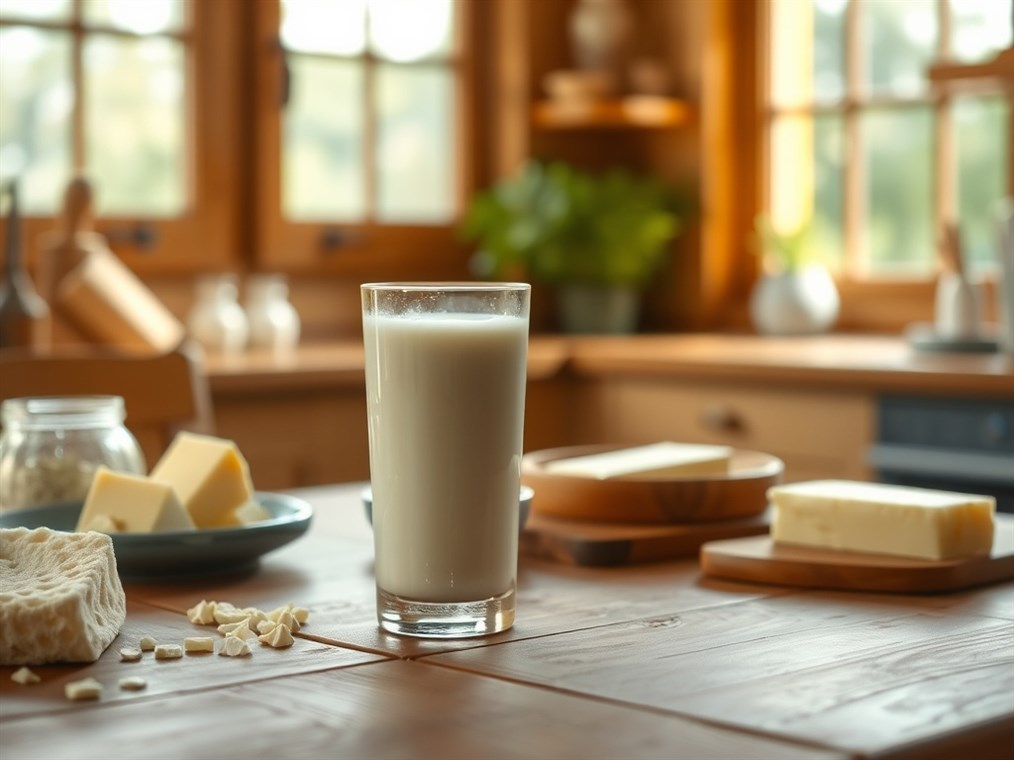Full Cream Milk: Friend or Foe? Let’s Spill the Milk.
Remember when we were all told to ditch full cream milk for the skimmed stuff? For years, low-fat was the mantra, especially when it came to dairy. The idea was simple: less fat, healthier heart. But lately, things have been getting a bit…milky. New research is stirring things up, making us rethink whether full cream milk is actually the villain it was made out to be. So, grab a glass, and let’s dive in!
What Is Full Cream Milk, Anyway?
Basically, it’s milk in its natural, unadulterated form. Think of it as the way the cow intended it! It’s got that creamy texture and richer flavor because it contains around 3.25% milk fat. Unlike its leaner cousins – 2%, 1%, and skim – nothing’s been taken out.
A Nutritional Rockstar
Okay, let’s be honest, full cream milk is packed with goodness. We’re talking about a serious dose of essential nutrients. In just one cup, you get a whole heap of stuff:
- Calories: Around 149
- Protein: A solid 8 grams – that’s muscle-building power!
- Fat: 8 grams (with about 5 grams of the saturated kind – more on that later!)
- Carbs: 12 grams
- Sugars (Lactose): 12 grams
- Calcium: A whopping 276 mg – that’s over 20% of what you need daily for strong bones!
- Vitamin D: 124 mcg – more than half of your daily needs!
- Vitamin B12: Plenty of this energy booster.
- Potassium, Phosphorus, Vitamin A, Riboflavin, Magnesium, Zinc, Iodine: It’s like a multivitamin in a glass!
And that’s not all! It’s a complete protein, meaning it’s got all nine essential amino acids your body can’t make on its own. Plus, those fat-soluble vitamins – A, D, E, and K – need fat to be properly absorbed. So, in a way, the fat is helping you get even more out of the milk.
The Great Saturated Fat Debate
Ah, the elephant in the dairy aisle! Saturated fat has been public enemy number one for ages. We’ve been told it clogs arteries, raises bad cholesterol, and leads to heart attacks. The American Heart Association still suggests opting for low-fat or fat-free dairy. And the official Dietary Guidelines? They’re still singing the low-fat tune.
But here’s where it gets interesting. Some recent studies are throwing a wrench in the works. They’re suggesting that the link between saturated fat and heart disease might not be as clear-cut as we thought. And when it comes to dairy fat specifically, some research is even hinting at a neutral, or even positive, effect on heart health. Mind. Blown.
Hold on…Benefits? Really?
Yep, you read that right. Some studies are actually finding potential upsides to full-fat dairy:
- Metabolic Syndrome? Maybe Not: Some research suggests full cream milk might lower your risk of metabolic syndrome – that nasty combo of high blood pressure, high blood sugar, and unhealthy cholesterol levels.
- Type 2 Diabetes? A Possible Link: Believe it or not, some studies have found that people with higher levels of dairy fat in their blood may be less likely to develop type 2 diabetes.
- Weight Management? Seriously?: I know, it sounds crazy, but some studies suggest full-fat dairy could actually help with weight control. That extra fat can keep you feeling fuller for longer, which could mean less snacking. One study even found that women who ate more full-fat dairy were less likely to gain weight over time.
- Good Cholesterol Boost: A study showed that full fat milk led to increased levels of HDL cholesterol (the “good” cholesterol) compared to skimmed milk.
- Vitamin Power-Up: Remember those fat-soluble vitamins? They need fat to be absorbed properly. So, full cream milk helps you get the most out of those vitamins.
Okay, So What’s the Catch?
Before you go chugging a gallon of full cream milk, let’s pump the brakes for a sec. There are still a few things to keep in mind:
- Your Health Matters: If you’ve got high cholesterol or are on a super strict diet, low-fat might still be the way to go.
- The Big Picture: Don’t just focus on the milk! Think about your whole diet. Are you eating plenty of fruits, veggies, and whole grains? It’s all about balance.
- Calories Count: Full cream milk does have more calories than the skimmed stuff. So, if you’re watching your weight, keep that in mind.
- Kids Are Different: Little ones under two usually need the fat in full-fat dairy for healthy brain development. But remember, cow’s milk isn’t recommended for babies under a year old.
The Final Verdict? It Depends.
So, is full cream milk healthy? The answer, like a good cup of coffee, is complex. The latest research is showing us that it can be part of a healthy diet for many of us. It’s packed with nutrients and might even have some surprising benefits. But, and it’s a big but, it’s not a free pass to ignore the rest of your diet.
The bottom line? There’s no one-size-fits-all answer. Chat with your doctor or a registered dietitian. They can help you figure out what kind of milk is best for you, based on your individual health and goals. After all, when it comes to your health, it’s always best to get expert advice.

